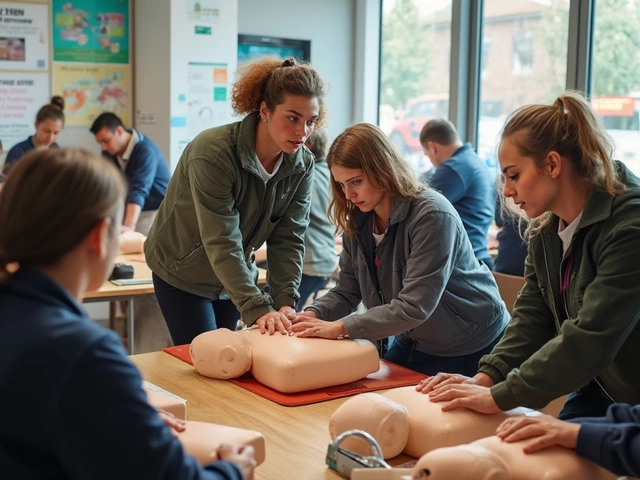The journey into teaching can begin at any stage of life, fueled by a multitude of motivations. While many embark on this path early, there are those who discover their calling later, often carrying a treasure trove of experience and knowledge. Misconceptions about age limitations in this vocation can deter individuals who possess a real gift for teaching, regardless of being in the golden years of life.
The question of age might loom large, but it's important to remember that the passion to impart knowledge does not diminish with the ticking of the clock. Even as the body ages, the ability to connect, inspire, and educate remains sharp. This exploration dives into the encouraging landscape of teaching careers unrestricted by age, capturing the essence of continuing education, flexibility, and the rich tapestry of life experiences that emerge when older individuals join the ranks of educators.
- Breaking Age Stereotypes in Education
- Benefits of Teaching at an Older Age
- Navigating Licensing and Training
- Incorporating Life Experience into Education
- Stories of Late Blooming Educators
Breaking Age Stereotypes in Education
Age stereotypes in the realm of education have long placed older individuals at the sidelines, subtly nudging them to consider retirement over reigniting or continuing a longtime vocation. Yet, more than ever, there's a shift toward recognizing the immense value that seasoned educators bring into the classroom. After all, effective teaching isn't just about youthful energy but also profound understanding and communication skills cultivated over years of life experience. As society increasingly acknowledges lifelong learning, it's pivotal to shatter the conventional thinking that younger invariably means better in teaching roles.
While younger teachers may bring fresh perspectives, it's important to acknowledge that older educators contribute, too. They offer a historical lens through which students can connect the dots from past to present, enriching the learning experience. Many students appreciate the stability and wisdom experienced teachers provide. A teacher who comes into the profession after a successful career in another field might ignite students' curiosity, showing them real-world applications of theory. Those who pivot to teaching later can provide relatable job experiences and grasp students' attention through stories that textbooks may lack, bringing lessons to life in unexpected and engaging ways.
Older teachers often face challenges when trying to break into teaching due to institutional biases. However, breaking through these stereotypes and stereotypes isn't merely about overcoming obstacles but about reframing the narrative around age. Data from the National Center for Education Statistics reveals that teachers above 40 tend to display higher job satisfaction and dedication, often leading to improved student achievement. Indeed, the world is slowly recognizing that a vibrant classroom isn't solely a function of chronological youth; it thrives on the rich diversity of experiences held by educators of all ages.
Quotes from education advocates and experts reflect this shift. Consider the words of Ken Robinson, a respected voice in the field, who stated,
"The best environments we can create in schools are ones that allow teachers of all ages to flourish because their diversity mirrors our complex society."Bringing change into awareness and acceptance that age is just a number enhances the educational landscape.
For schools considering the integration of older teachers, it might be beneficial to establish mentorship programs where veteran educators can partner with younger counterparts. This reciprocity not only benefits students but fosters mutual growth among teachers, leading to enriched educational strategies and a collaborative spirit. In doing so, the profession would not only nurture fresh ideas and enthusiasm but would interweave them with the wisdom and stability innate to experienced educators.
Benefits of Teaching at an Older Age
Welcoming the notion of teaching in later life is akin to opening a door to boundless possibilities. Older educators bring to the table a wealth of real-world experiences and finely honed skills that can greatly enrich the learning environment. Their seasoned perspectives can indeed create a deeply enriching educational experience for students across ages. Entering the teaching profession past traditional retirement age is not only plausible but beneficial due to the unique assets older adults contribute to education.
One of the primary benefits is the enriching life experience that only years can provide. Older teachers have likely navigated through varied personal and professional landscapes, giving them the ability to offer practical advice coupled with theoretical knowledge. Navigating life's ups and downs cultivates resilience, empathy, and patience, critical virtues in any educational setting. These are not merely traits learned from a textbook; rather, they are forged through time and circumstance, giving them a deeper resonance with students.
There is also the aspect of emotional intelligence which tends to deepen with age. Many older teachers have raised families or played prominent roles in their communities, and this type of experience can lend them a nuanced understanding of human behavior. Such insight is invaluable when dealing with a classroom full of diverse personalities. As a classroom leader, the ability to understand and respond to the emotional cues of students can facilitate a nurturing and supportive learning atmosphere.
"Teaching might even be the greatest of the arts since the medium is the human mind and spirit," said John Steinbeck, encapsulating the boundless potential of the teaching profession in one profound statement.
Additionally, older educators often exhibit high degrees of dedication and professionalism. Having carved out careers for themselves in various fields, they understand the commitment required to achieve success and are often prepared to demonstrate just as much dedication to their students' education. This commitment can reflect in better lesson planning, classroom management, and a consistent presence that students can rely on.
Moreover, older teachers can serve as incredible role models. Their presence in the education sector defies prevalent age stereotypes, sending a strong message that passion and the willingness to learn and teach do not diminish with age. This can be inspirational not only to their peers but also to students who may hold age-related misconceptions.
In terms of impact, studies have shown that schools can greatly benefit from the diverse perspectives that older teachers bring. An environment enriched with experiences—spanning from the days before the digital age to current technological advancements—can offer students a more rounded worldview. Such teachers often present knowledge in ways that may not conform to typical textbooks but instead provide rich, anecdotal insights, further enriching the education experience for those they teach.

Navigating Licensing and Training
Embarking on a new teaching journey at an advanced age presents unique challenges, particularly in terms of licensing and training. Every profession has its bureaucratic demands, and teaching is no exception. To become a certified teacher, an individual must usually hold a degree, pass required examinations, and fulfil specific training hours. The requirements vary depending on geography, but a common thread is the necessity to be well-prepared for the classroom environment.
Many might think the process is daunting, especially for those who are re-entering an educational setting after decades. Yet, an increasing number of universities and institutes offer unique pathways for older students. These programs often recognize prior learning and life experience, significantly reducing the need to complete redundant study modules. This can be an enticing prospect for those considering teaching as a late career move. Some states in the U.S offer alternative certification routes designed specifically for mid-career professionals.
A New York Times article once stated, "The focus on recruiting mid-career professionals into teaching not only enriches the classroom but revitalizes the educator pool with diverse experiences."
For those poised to adapt, technology can be a wonderful aid. Online classes, webinars, and virtual seminars mean aspiring teachers can learn at their pace, fitting their studies around existing commitments. This flexibility contrasts greatly with traditional routes that demand attendance and rigid schedules. Of course, some skills must be developed in person, but much of the foundational knowledge can be acquired remotely.
The plethora of resources available online today is immense. From free courses offered by renowned institutions to peer-led forums discussing exam strategies, the internet is a veritable treasure chest of information for prospective teachers. There are many sites where potential educators can download practice tests, review study guides, or even engage with others walking a similar path. For those restoring their familiarity with subject matter, platforms like Khan Academy and Coursera remain fantastic resources.
Despite these conveniences, the physical demands of teaching cannot be ignored. Maintaining stamina—both mental and physical—is crucial. Engaging with students of varied energies can be taxing. To this end, candidates benefit from seeking schools or educational bodies that provide mentoring programs. Partnering with seasoned teachers can aid exponentially in transitioning smoothly into effective educators.
Engaging in trial teaching opportunities or volunteering can cement theoretical knowledge into practice, offering firsthand experience in managing a classroom. This proves invaluable, granting burgeoning teachers insight into their style of teaching and areas that require honing. Perhaps equally vital is constant communication with the board or institution responsible for issuing licenses. They often provide invaluable guidance on procedures and timelines, easing the labyrinthine path to certification.
Maintaining a Growth Mindset
For older teachers, approaching training with a growth mindset is beneficial. The belief that skills can be developed through dedication, perseverance, and insight is transformative. Viewing setbacks as opportunities for growth instead of permanent failures reshapes the learning narrative. Education fields' perennial thirst for passionate, dedicated members ensures pathways and resources continually evolve to support those transitioning later in life.
Incorporating Life Experience into Education
In the tapestry of education, life experience weaves threads of patience, insight, and empathy, offering students a richer learning environment. Those who take up teaching in their later years bring vast reserves of wisdom to the classroom. Over decades, they have accumulated a wealth of real-world knowledge, enriching their teaching with anecdotes and perspectives that a textbook alone cannot provide. For example, a former engineer can transform complex math theories into practical problems, making learning not only more relatable but also sparks curiosity among students. When faced with knowledge from someone who has lived through the tales they tell, students are often more engaged, finding real-life applications to the concepts they study.
Consider the different walks of life from which elder educators come. Some may have traveled the world, experiencing diverse cultures and socioeconomic realities, while others might have risen through corporate ladders, navigated tumultuous career paths, or pioneered innovations. Each story, each lesson is a bridge to understanding human ambition, failure, and dreams. Classroom discussions benefit as such stories convey intricacies of life’s dynamic challenges and successes. This isn't just knowledge transfer; it's an invitation to think critically, appreciate diversity, and inspire motivation.
"Education is not the filling of a pail, but the lighting of a fire," poet William Butler Yeats once suggested. In this light, seasoned teachers can stoke the flames of curiosity by sharing personal journeys, offering a peek into a vast repository of experience.
Moreover, having witnessed and adapted to numerous technological transformations, older teachers provide unique insights. From handwritten letters to emails, or from calculators to smartphones, each advancement they recollect is a historical lesson, demonstrating progress's impact on society. Yet, their stories aren't just about the golden oldies but include the pragmatic leap into learning how to create digital content, use apps, or manage virtual classrooms - skills they never initially imagined needing.
Engaging veteran teachers can also bolster students' understanding of the evolving work environment. They frequently illustrate the soft skills and adaptability that each generation must hone to remain relevant. They share stories of resilience from setbacks, underscoring the importance of perseverance and creative problem-solving. Lessons learnt outside the confines of academia serve as poignant reminders of why education is a lifelong journey and embracing change is crucial.
The holistic impact of having teachers rich in life experience is also mirrored in societal perspectives. The very presence of older educators validates the narrative that learning is timeless. It underscores that professional aspirations and contributions are limitless, and age should not be seen as a barrier but a merit. While they continue to impart technical skills, the personal growth instilled in students - values like integrity, courage, and respect - benefits society at large.
To make the most of these experiences, schools can incorporate programs enabling cross-generational exchange, where older teachers mentor newer ones. Such collaborative efforts enrich the teaching community, fostering an inherent learning culture beyond the students themselves. As seasoned educators adapt and thrive in modern teaching environments, they don't just survive; they thrive, proving that the art of teaching welcomes and flourishes with diversity in age.

Stories of Late Blooming Educators
When we think of educators, our minds often drift to fresh-faced graduates launching their first classroom experiences. Yet, sprinkled throughout the field are numerous stories of late blooming educators whose journeys into teaching began long after their golden jubilee. These inspiring individuals defy norms and prove that age is no barrier to making a meaningful impact in education. Take the case of Tony Wagner, who after decades as a businessman, transitioned to a high school teacher in New York. Tony's rich experience in the corporate world provided him with a unique perspective and a toolkit of real-world examples that captivated his students.
Teaching career age limit is often assumed, yet the stories of perseverance and passion challenge this idea. For every Tony, there is a Henrietta Lacks, who at the age of 65, found herself drawn to teaching science after retiring from nursing. With her career spanning three decades in healthcare, Henrietta brought an unmatched depth of knowledge to her classroom. She taught students not just about the wonders of anatomy but also conveyed the human element of medical care, something solely achieved through lived experience. It's these late starts that enrich the educational landscape, infusing classrooms with the kind of insights only garnered through a lifetime of work.
Sometimes, late blooming results from later-life epiphanies. Esteemed historian John Goodwin discovered his passion for teaching at 55. Having spent years in historical research and authorship, he felt an urge to impart his understanding directly to young minds. His lectures aren't just typical history lessons; they're vivid stories brought to life, much like a narrative unfolding before his students' eyes. His classes became popular among students who valued his historical storytelling approach. A distinct advantage older educators possess is their wealth of experience, allowing for a teaching style that's often as nuanced as it is rich.
"It's never too late to be what you might have been." — George Eliot
The rewards of teaching later in life are equally emotional and intellectual. Consider Susan Cochran, who embraced teaching at 60 after her children went to college. While teaching English literature, she found herself growing alongside her students, relishing both the textbooks' narratives and the dialogue they inspired. It became an unexpected opportunity for Susan to learn anew, delighting in the discovery of themes and interpretations through the eyes of teenagers. Such stories not only highlight the tenacity needed to switch careers late but also the mutual benefits students and senior educators gain through shared learning experiences.
The Impact of Late Bloomers on Students
Aspiring older educators worry about meeting teaching career age limits, yet it's clear they contribute uniquely. These educators often serve as mentors, offering wisdom beyond the curriculum that can significantly shape a student's outlook on life. Agnes Miller, a former engineer now teaching math, inspired countless students to pursue STEM fields. Her tangible success stories and advice on navigating STEM careers were often more valuable than textbook lessons, showing students the practical applications of theories they studied. Her role was transformative, enhancing not only academic but personal growth in her students, reflecting how late starting educators add dimensions of depth and inspiration.





Write a comment